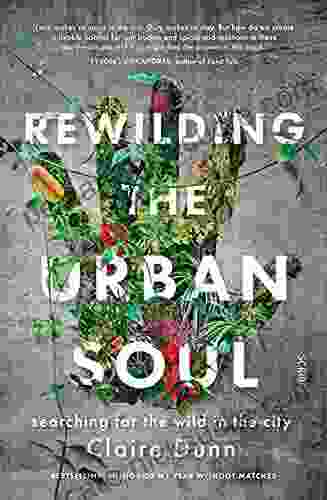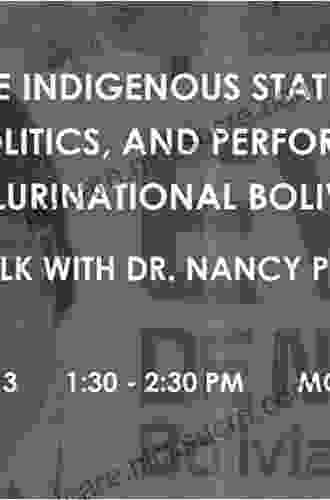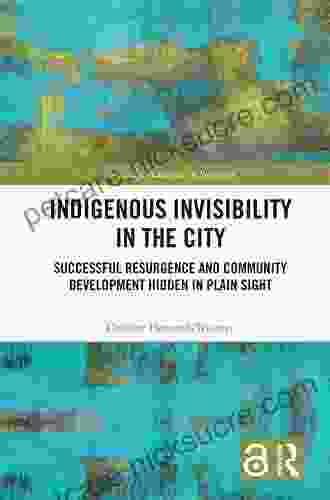Race Politics and Performance in Plurinational Bolivia: Exploring Identity, Inequality, and Social Justice

Plurinational Bolivia, a country in central South America, has witnessed significant political and social transformations in recent decades. The adoption of the 2009 Constitution, which recognizes Bolivia as a plurinational state, has led to a heightened focus on the rights and identities of indigenous communities. This shift has also had a profound impact on the realm of artistic expression and performance, with artists and activists using their platforms to interrogate issues of race, identity, and social justice.
4 out of 5
| Language | : | English |
| File size | : | 23093 KB |
| Text-to-Speech | : | Enabled |
| Screen Reader | : | Supported |
| Enhanced typesetting | : | Enabled |
| Word Wise | : | Enabled |
| Print length | : | 243 pages |
| Lending | : | Enabled |
In this article, we will delve into the intricate interplay between race politics and performance in contemporary Bolivia. We will explore how artistic practices, such as theater, music, and dance, provide critical spaces for confronting historical and ongoing inequalities, challenging dominant narratives, and envisioning alternative forms of social organization.
Race, Identity, and the Politics of Representation
Bolivia is a country with a diverse population, including indigenous Aymara, Quechua, Guaraní, and other indigenous groups, as well as mestizo (mixed-race) and white populations. For centuries, indigenous communities have faced discrimination, marginalization, and exclusion from mainstream society. The 2009 Constitution sought to address these historical injustices by recognizing the rights of indigenous peoples to their lands, languages, and cultural practices.
However, despite these legal reforms, indigenous Bolivians continue to experience significant social and economic disparities. They are more likely to live in poverty, have lower levels of education, and face discrimination in employment and other areas. This ongoing inequality provides a fertile ground for artistic expression that confronts the politics of representation and challenges dominant narratives of race and identity.
One powerful example is the work of Teatro de los Andes, a theater company founded by renowned Bolivian playwright and director César Brie. Teatro de los Andes has a long history of creating performances that engage with issues of race, class, and social justice. In their play "El Cuarto" (The Room),the company explores the experiences of indigenous women in Bolivia, highlighting the multiple forms of oppression they face based on their race, gender, and socioeconomic status.
Performance as a Tool for Social Critique
Performance art provides a unique medium for artists to critique social and political issues, often in ways that are more accessible and impactful than traditional forms of protest or activism. In Bolivia, performance art has played a vital role in raising awareness about the challenges faced by indigenous communities and in challenging stereotypes and prejudices.
One prominent figure in the Bolivian performance art scene is Alfredo La Placa. La Placa is known for his provocative performances that explore themes of indigenous identity, colonial trauma, and the search for justice. In his performance "El Indio" (The Indian),La Placa uses his own body as a canvas to represent the scars and wounds inflicted upon indigenous peoples throughout history.
Another example is the work of Colectivo Callejeras, a feminist collective that uses theater and street performances to address issues of gender, sexuality, and race. Their performances often take place in public spaces, engaging directly with passersby and challenging traditional norms and expectations.
Decolonization and the Arts
The pursuit of decolonization, a process of dismantling colonial structures and relationships, has been a central theme in Bolivian politics and society since the early 20th century. Decolonization extends beyond political and economic spheres, encompassing cultural and artistic practices as well.
In the realm of performance, decolonization involves challenging Eurocentric aesthetics, reclaiming indigenous knowledge and traditions, and creating new forms of artistic expression that reflect the diverse experiences of Bolivia's indigenous communities.
One notable example is the resurgence of traditional Andean music and dance. In recent years, there has been a growing movement to revitalize and preserve these cultural practices, which were suppressed during colonial times. Indigenous musicians and dancers are using their performances as a way to connect with their cultural heritage, assert their identity, and resist the assimilationist pressures of mainstream society.
Another example is the work of artist Mamani Mamani, who uses his paintings to depict the history and struggles of indigenous peoples in Bolivia. Mamani Mamani's art challenges conventional representations of indigenous communities and invites viewers to reconsider the ways in which race and identity have been constructed and contested throughout history.
The intersections of race politics and performance in Plurinational Bolivia offer a rich and complex lens through which to understand the ongoing struggles for identity, equality, and social justice. Artistic practices, from theater to music to dance, provide vital platforms for confronting historical and ongoing inequalities, challenging dominant narratives, and envisioning alternative forms of social organization.
As Bolivia continues to navigate its complex political and social landscape, performance art will undoubtedly play an increasingly important role in shaping the nation's discourse on race, identity, and the pursuit of a more just and equitable society.
4 out of 5
| Language | : | English |
| File size | : | 23093 KB |
| Text-to-Speech | : | Enabled |
| Screen Reader | : | Supported |
| Enhanced typesetting | : | Enabled |
| Word Wise | : | Enabled |
| Print length | : | 243 pages |
| Lending | : | Enabled |
Do you want to contribute by writing guest posts on this blog?
Please contact us and send us a resume of previous articles that you have written.
 Fiction
Fiction Non Fiction
Non Fiction Romance
Romance Mystery
Mystery Thriller
Thriller SciFi
SciFi Fantasy
Fantasy Horror
Horror Biography
Biography Selfhelp
Selfhelp Business
Business History
History Classics
Classics Poetry
Poetry Childrens
Childrens Young Adult
Young Adult Educational
Educational Cooking
Cooking Travel
Travel Lifestyle
Lifestyle Spirituality
Spirituality Health
Health Fitness
Fitness Technology
Technology Science
Science Arts
Arts Crafts
Crafts DIY
DIY Gardening
Gardening Petcare
Petcare Didier Reiss
Didier Reiss Steve Crawford
Steve Crawford Mildred Council
Mildred Council Ian Sample
Ian Sample Ashley Stanford
Ashley Stanford Sally A Lipsky
Sally A Lipsky Carola Hein
Carola Hein Deborah Spungen
Deborah Spungen Russ Moorhouse
Russ Moorhouse Evelyn Raab
Evelyn Raab Naomi Moriyama
Naomi Moriyama D James Benton
D James Benton Elizabeth Becker
Elizabeth Becker Joyce L Vedral
Joyce L Vedral Kiley Reid
Kiley Reid Lisa Marasco
Lisa Marasco Kara Goucher
Kara Goucher Estelle Maskame
Estelle Maskame John S Farnam
John S Farnam Doug Degrood
Doug Degrood Mark Santino
Mark Santino Gerd Gigerenzer
Gerd Gigerenzer Alison Pray
Alison Pray Karina Manta
Karina Manta Jay Carter
Jay Carter Lei Wang
Lei Wang James Proctor
James Proctor Chris Parsons
Chris Parsons Erin Miller
Erin Miller Mark Lattanzi
Mark Lattanzi Thomas Lickona
Thomas Lickona David Fine
David Fine Lani Forbes
Lani Forbes Jonathan Tarbox
Jonathan Tarbox Rebekah Dodson
Rebekah Dodson Guy Harrison
Guy Harrison Michelle Damiani
Michelle Damiani Michele Smith
Michele Smith H Lee Jones
H Lee Jones Michael Clarke
Michael Clarke Andy Kirkpatrick
Andy Kirkpatrick Elaine Heney
Elaine Heney James Adams
James Adams Paul Haddad
Paul Haddad Jacqueline Carey
Jacqueline Carey Botros Rizk
Botros Rizk Lou Nanne
Lou Nanne Stanley Vast
Stanley Vast Keshia A Case
Keshia A Case Mike Chappell
Mike Chappell Chad Waterbury
Chad Waterbury Arden Rose
Arden Rose R J Vickers
R J Vickers Sophie Kinsella
Sophie Kinsella Intelligent
Intelligent Ejike Ifeanyichukwu
Ejike Ifeanyichukwu Sarah A Clark
Sarah A Clark Alan Naldrett
Alan Naldrett Sarah Thompson
Sarah Thompson Alexandra Witze
Alexandra Witze Jamie Whyte
Jamie Whyte Francis L Macrina
Francis L Macrina Ali Psiuk
Ali Psiuk Karen L Cox
Karen L Cox Hafsah Faizal
Hafsah Faizal Louise Warneford
Louise Warneford Mae Ilami Onyekwum
Mae Ilami Onyekwum Jandy Nelson
Jandy Nelson Jeanne Oliver
Jeanne Oliver Daniel L Schacter
Daniel L Schacter Forrest Willett
Forrest Willett Emily Vikre
Emily Vikre Nicole Libin Phd
Nicole Libin Phd Ewan Mcgregor
Ewan Mcgregor Hannu Rajaniemi
Hannu Rajaniemi Teddy Atlas
Teddy Atlas Randall M Packard
Randall M Packard Bill Rodgers
Bill Rodgers Rachael Bell Irving
Rachael Bell Irving Anne Polli
Anne Polli Chris Stringer
Chris Stringer Darril Fosty
Darril Fosty My Daily German
My Daily German Morten H Christiansen
Morten H Christiansen Christian Fader
Christian Fader Jean Pierre De Caussade
Jean Pierre De Caussade Desiree Trattles
Desiree Trattles Pete Magill
Pete Magill Bob Allcorn
Bob Allcorn Maureen Dempsey
Maureen Dempsey Mindfulness Hypnosis Academy
Mindfulness Hypnosis Academy Piotr Naskrecki
Piotr Naskrecki Sharon Wilkins
Sharon Wilkins Laura Prepon
Laura Prepon Edward Marston
Edward Marston Steve Garratt
Steve Garratt Jay Cassell
Jay Cassell Shane Benzie
Shane Benzie Cathy Hester Seckman
Cathy Hester Seckman S K Gupta
S K Gupta Richard Hofstadter
Richard Hofstadter Karyn Garvin
Karyn Garvin Alexandre Paiva
Alexandre Paiva Arny Alberts
Arny Alberts Bilingual Edition Kindle Edition
Bilingual Edition Kindle Edition Paul Gaskell
Paul Gaskell Robyn Hawkins
Robyn Hawkins Janet Malcolm
Janet Malcolm Tyler Lansford
Tyler Lansford House Of Talent
House Of Talent 1st Ed 2019 Edition Kindle Edition
1st Ed 2019 Edition Kindle Edition Stephen Bodio
Stephen Bodio Egerton Ryerson Young
Egerton Ryerson Young Richard Pears
Richard Pears Andrea Sfiligoi
Andrea Sfiligoi Irene Spencer
Irene Spencer Michael Ross
Michael Ross Samuel Owedyk
Samuel Owedyk Wabun Wind
Wabun Wind Amanda Claridge
Amanda Claridge Joshua Darwin
Joshua Darwin Guillermo Gonzalez
Guillermo Gonzalez Joachim Rossberg
Joachim Rossberg 1st Ed 2017 Edition Kindle Edition
1st Ed 2017 Edition Kindle Edition Leonard Sax
Leonard Sax Helen Batten
Helen Batten Glenda Green
Glenda Green Judith Warner
Judith Warner Natsuki Takaya
Natsuki Takaya Derek Rowntree
Derek Rowntree Wendy Sullivan
Wendy Sullivan Tim Hollister
Tim Hollister Kathleen Buckstaff
Kathleen Buckstaff Nancy Hendrickson
Nancy Hendrickson Peter Heller
Peter Heller John Small
John Small Jamie Dorobek
Jamie Dorobek James Ragonnet
James Ragonnet Joanne Calderwood
Joanne Calderwood Bryn Huntpalmer
Bryn Huntpalmer Carol Matsuzaki
Carol Matsuzaki Amanda Kingloff
Amanda Kingloff Andrew Solomon
Andrew Solomon Harry Fisch
Harry Fisch Denis Dwyer
Denis Dwyer Michael R Canfield
Michael R Canfield Philip Moore
Philip Moore Will Nett
Will Nett Pat Manley
Pat Manley Fern Nichols
Fern Nichols Jean Yves Leloup
Jean Yves Leloup Yaron Seidman
Yaron Seidman Keith Bowden
Keith Bowden Pam Jarvis
Pam Jarvis Tadahiko Mizuno
Tadahiko Mizuno Ray Mcnulty
Ray Mcnulty Latham Thomas
Latham Thomas David Weber
David Weber Larry Kaniut
Larry Kaniut Neil Sagebiel
Neil Sagebiel Carmen Acevedo Butcher
Carmen Acevedo Butcher Livy
Livy Alice Waters
Alice Waters Lars Anderson
Lars Anderson Leonie Mack
Leonie Mack R K Agarwal
R K Agarwal Belinia Xenrale
Belinia Xenrale 1st Ed 2016 Edition Kindle Edition
1st Ed 2016 Edition Kindle Edition Dk Publishing
Dk Publishing Larry Krieger
Larry Krieger Brent E Turvey
Brent E Turvey Paul Annacone
Paul Annacone Daniel Todd Gilbert
Daniel Todd Gilbert Liz Thomas
Liz Thomas Michael T Mcdermott
Michael T Mcdermott Edward A Bell
Edward A Bell Stephen R Lawhead
Stephen R Lawhead Kaoru Sinozaki
Kaoru Sinozaki Jim Baggott
Jim Baggott Asti Hustvedt
Asti Hustvedt Lh Press
Lh Press David I Spivak
David I Spivak Day Schildkret
Day Schildkret Jacob Stegenga
Jacob Stegenga Gary M Schultheis
Gary M Schultheis Jesse M Ehrenfeld
Jesse M Ehrenfeld Shalini Shankar
Shalini Shankar Janice Hudson
Janice Hudson Geoff Powter
Geoff Powter Mary Douglas
Mary Douglas Manjit Kumar
Manjit Kumar Diana Papaioannou
Diana Papaioannou Larry A Yff
Larry A Yff Alex Hibbert
Alex Hibbert Leona S Aiken
Leona S Aiken Charles Fleming
Charles Fleming Taylor Fontenot
Taylor Fontenot Kay Kennedy
Kay Kennedy Burt L Standish
Burt L Standish Jeffrey S Saltz
Jeffrey S Saltz Jill Heinerth
Jill Heinerth Robin Hobb
Robin Hobb Lawrence T Friedhoff
Lawrence T Friedhoff Roger Frampton
Roger Frampton Gail Buckland
Gail Buckland Leslie Anthony
Leslie Anthony Jeremy Bhandari
Jeremy Bhandari Adam Rutherford Phd
Adam Rutherford Phd Karen Kovacs
Karen Kovacs Jeff Benedict
Jeff Benedict Julia Rutland
Julia Rutland Bill Douglas
Bill Douglas Christian Straube
Christian Straube David Barrett
David Barrett Phil Mickelson
Phil Mickelson Robert Chu
Robert Chu Mark Vee John
Mark Vee John Deborah T Goldberg
Deborah T Goldberg Linda L French
Linda L French Ruth Ware
Ruth Ware The Lodge Company
The Lodge Company Mark Miller
Mark Miller Jo Bartlett
Jo Bartlett Jeremy Lent
Jeremy Lent Jacob Gardner
Jacob Gardner Holly Hook
Holly Hook Rollo Tomassi
Rollo Tomassi Terry Pratchett
Terry Pratchett Harold Simmons
Harold Simmons Michael Borenstein
Michael Borenstein Clifford E Trafzer
Clifford E Trafzer Chip Ingram
Chip Ingram Daisaku Ikeda
Daisaku Ikeda Dorthe Berntsen
Dorthe Berntsen John L Havlin
John L Havlin Kev Reynolds
Kev Reynolds Jane Yeadon
Jane Yeadon Nancy B Rapoport
Nancy B Rapoport Jamil Zaki
Jamil Zaki Valerie Nash Chang
Valerie Nash Chang Raven Morgaine
Raven Morgaine Jack Newfield
Jack Newfield M L Buchman
M L Buchman Diane H Tracey
Diane H Tracey Ben Rothenberg
Ben Rothenberg Anton Angelov
Anton Angelov Phyllis Franklin
Phyllis Franklin M Susan Lindee
M Susan Lindee Gary E Schwartz
Gary E Schwartz Traci Chee
Traci Chee Alan Greenfield
Alan Greenfield Robert Milner
Robert Milner Pam Vredevelt
Pam Vredevelt Tillie Cole
Tillie Cole Marva Collins
Marva Collins Nicole Zasowski
Nicole Zasowski Erfun Geula
Erfun Geula Christopher Hook
Christopher Hook Patricia B Mcconnell
Patricia B Mcconnell Alexandra Kenin
Alexandra Kenin Lisa R Cohen
Lisa R Cohen Lindsey Bliss
Lindsey Bliss Felicia Pizzonia
Felicia Pizzonia Scott Matthews
Scott Matthews Helen Garabedian
Helen Garabedian John Vigor
John Vigor Taran Matharu
Taran Matharu Dr Mike Grevlos
Dr Mike Grevlos Loudell F Snow
Loudell F Snow Ashlee Kasten
Ashlee Kasten John T Cacioppo
John T Cacioppo Elizabeth Field
Elizabeth Field Aaron T Beck
Aaron T Beck Ivana Bajic Hajdukovic
Ivana Bajic Hajdukovic Lori Bregman
Lori Bregman George Mount
George Mount Julie K Briggs
Julie K Briggs Bud Hasert
Bud Hasert Ann Olga Koloski Ostrow
Ann Olga Koloski Ostrow Karl Rehn
Karl Rehn Susan Ludington Hoe
Susan Ludington Hoe Amanda Brooks
Amanda Brooks Eryk Lewinson
Eryk Lewinson Diane Vaughan
Diane Vaughan Lenora Chu
Lenora Chu Tamonya Sands
Tamonya Sands Jonathan Vaughters
Jonathan Vaughters Robyn Perry Worthington
Robyn Perry Worthington Jacob Cohen
Jacob Cohen Nathan D Lang Raad
Nathan D Lang Raad Barry Ord Clarke
Barry Ord Clarke S Elia
S Elia Lynne Tolley
Lynne Tolley David Faulkner
David Faulkner Modestus Anabaraonye
Modestus Anabaraonye Megan Sloan
Megan Sloan Ronald York
Ronald York Broccoli Lion
Broccoli Lion Sarah A Reinhard
Sarah A Reinhard Peter Hessler
Peter Hessler Natalia Molina
Natalia Molina Eric Sevareid
Eric Sevareid Charlotte Eliopoulos
Charlotte Eliopoulos Samantha Boardman
Samantha Boardman Suzy Hopkins
Suzy Hopkins 15th Edition Kindle Edition
15th Edition Kindle Edition Beryl Beare
Beryl Beare Derald Wing Sue
Derald Wing Sue Grace Liu
Grace Liu Paul A Laviolette
Paul A Laviolette Robert Lomas
Robert Lomas Felicity Cloake
Felicity Cloake David Wolff
David Wolff Patricia G Lange
Patricia G Lange Robert Clifton Robinson
Robert Clifton Robinson Alice Roberts
Alice Roberts Frank Wilczek
Frank Wilczek Timothy R Pauketat
Timothy R Pauketat Isa Herrera
Isa Herrera Janice K Ledford
Janice K Ledford Dan Robson
Dan Robson Joseph Mercola
Joseph Mercola Skylar Kergil
Skylar Kergil Jody Morse
Jody Morse Rafael Nadal
Rafael Nadal Lavinia Collins
Lavinia Collins Rana Conway
Rana Conway Christopher Carter
Christopher Carter Kyler Shumway
Kyler Shumway Brent Warner
Brent Warner Saroo Brierley
Saroo Brierley Julie Angus
Julie Angus Daniel Scott
Daniel Scott Daniel H Pink
Daniel H Pink Caroline Fidanza
Caroline Fidanza Ian Stewart
Ian Stewart Cal Peternell
Cal Peternell Jacqueline Corricelli
Jacqueline Corricelli Michael Schiavone
Michael Schiavone Sean Fitz Gerald
Sean Fitz Gerald Raymond Arsenault
Raymond Arsenault Sandra Uwiringiyimana
Sandra Uwiringiyimana Launi Meili
Launi Meili Spire Study System
Spire Study System Jerome Rand
Jerome Rand Travis Senzaki
Travis Senzaki Knowledge Tree
Knowledge Tree Graham Priest
Graham Priest Irina Szmelskyj
Irina Szmelskyj Laura Luther
Laura Luther Sarah Lawton
Sarah Lawton Richard E Nisbett
Richard E Nisbett Joshua James
Joshua James Sara Saedi
Sara Saedi Mark Seidenberg
Mark Seidenberg Seth Tucker
Seth Tucker Kathy Farrokhzad
Kathy Farrokhzad Joan Ryan
Joan Ryan Bob Chandler
Bob Chandler Aron Ralston
Aron Ralston Peter Lightbown
Peter Lightbown 1st Ed 2021 Edition Kindle Edition
1st Ed 2021 Edition Kindle Edition Rachel Reed
Rachel Reed Monte Burch
Monte Burch Orji Onyebuchi
Orji Onyebuchi Amita Jassi
Amita Jassi Franz Boas
Franz Boas Lech A Grzelak
Lech A Grzelak Alison Gopnik
Alison Gopnik 1st Ed 2018 Edition Kindle Edition
1st Ed 2018 Edition Kindle Edition Christa Mackinnon
Christa Mackinnon Ellie Marney
Ellie Marney Tim Powers
Tim Powers Kim Mack Rosenberg
Kim Mack Rosenberg Teri Tom
Teri Tom William E Glassley
William E Glassley Mara Rutherford
Mara Rutherford Shane Jones
Shane Jones Xiufeng Liu
Xiufeng Liu Berkshire K Greene
Berkshire K Greene Robyn Ryle
Robyn Ryle Geraint Thomas
Geraint Thomas Evy Poumpouras
Evy Poumpouras Rick Barba
Rick Barba Rosemary Ellen Guiley
Rosemary Ellen Guiley Peter Burns
Peter Burns Rebecca Solnit
Rebecca Solnit Ron Larson
Ron Larson Brian Meier
Brian Meier Norman Delgado
Norman Delgado Robert Oerter
Robert Oerter David Roberts
David Roberts 1st Ed 2020 Edition Kindle Edition
1st Ed 2020 Edition Kindle Edition Robert Lanza
Robert Lanza Tim Deroche
Tim Deroche James M Tabor
James M Tabor Stacey Steinberg
Stacey Steinberg Editions La Plume D Eros
Editions La Plume D Eros Vikas Bhushan
Vikas Bhushan Bruce Brown
Bruce Brown T M Mikita
T M Mikita Zachary Willey
Zachary Willey Elizabeth Heavey
Elizabeth Heavey Philippa Langley
Philippa Langley Katie Singer
Katie Singer Ben Coates
Ben Coates Matthew Harffy
Matthew Harffy Nicholas J Saunders
Nicholas J Saunders Brad Myers
Brad Myers Duncan Hamilton
Duncan Hamilton Kristen Thrasher
Kristen Thrasher Anthony Haynes
Anthony Haynes Emily Chetkowski
Emily Chetkowski Ivor Horton
Ivor Horton Janet Godwin
Janet Godwin Dana Trentini
Dana Trentini Clark A Campbell
Clark A Campbell Nick Redfern
Nick Redfern Susan Alcorn
Susan Alcorn Paul Johnson
Paul Johnson Michael Archer
Michael Archer Christine E Sleeter
Christine E Sleeter Adam Cesare
Adam Cesare Monica Beyer
Monica Beyer Anthony Burgess
Anthony Burgess Sharon Copeland
Sharon Copeland Six Sisters Stuff
Six Sisters Stuff Dylan Dethier
Dylan Dethier Robert Irwin
Robert Irwin Paul Freedman
Paul Freedman Maia Motley
Maia Motley Heather A Smith
Heather A Smith Mambo Chita Tann
Mambo Chita Tann Tom Chivers
Tom Chivers Hana Ali
Hana Ali 1st Edition Kindle Edition
1st Edition Kindle Edition Marisa Kanter
Marisa Kanter Fletcher Dunn
Fletcher Dunn Craig Clapper
Craig Clapper Ukay J Ekong
Ukay J Ekong Geoff Johns
Geoff Johns Ann Jackson
Ann Jackson Dierdre Wolownick Honnold
Dierdre Wolownick Honnold Mike Lanza
Mike Lanza Alan Agresti
Alan Agresti David Clark
David Clark Timothy Dickeson
Timothy Dickeson Matthew Dworak
Matthew Dworak J F Tamayo
J F Tamayo Kim Dwinell
Kim Dwinell Andrew Evans
Andrew Evans Elise Hennessy
Elise Hennessy Gary Dierking
Gary Dierking Philip Coppens
Philip Coppens Bruce Chatwin
Bruce Chatwin Ric Conrad
Ric Conrad Otto Toeplitz
Otto Toeplitz Kajal Gupta
Kajal Gupta Harvey Penick
Harvey Penick Gill Stewart
Gill Stewart Wendy Higgins
Wendy Higgins Webb Chiles
Webb Chiles Nick Morrison
Nick Morrison Hesam Nemounehkhah
Hesam Nemounehkhah Raichelle Carter
Raichelle Carter Joshua G Shifrin
Joshua G Shifrin Mayim Bialik
Mayim Bialik Wolfgang Jank
Wolfgang Jank George Grimm
George Grimm Perre Coleman Magness
Perre Coleman Magness Jason Sumner
Jason Sumner Andrea Olson
Andrea Olson Florence Nightingale
Florence Nightingale Sara Snow
Sara Snow John Toussaint
John Toussaint Mike Barrett
Mike Barrett Claire Dunn
Claire Dunn Cathy Raubenheimer
Cathy Raubenheimer Sanjay Sarma
Sanjay Sarma Adeline Yen Mah
Adeline Yen Mah R I Chalmers
R I Chalmers Disha Experts
Disha Experts Os Guinness
Os Guinness Mike Bender
Mike Bender Chris J Ellis
Chris J Ellis Matthew B Crawford
Matthew B Crawford Carol Lynn Mckibben
Carol Lynn Mckibben David Kahn
David Kahn Jareth Tempest
Jareth Tempest Jon Young
Jon Young Vaclav Smil
Vaclav Smil Nageshwar Sah
Nageshwar Sah Stephen C Meyer
Stephen C Meyer Dinah Bucholz
Dinah Bucholz Brian Fagan
Brian Fagan Gerald Beaudry
Gerald Beaudry 6th Edition Kindle Edition
6th Edition Kindle Edition Bradmd
Bradmd
Light bulbAdvertise smarter! Our strategic ad space ensures maximum exposure. Reserve your spot today!
 Kenzaburō ŌeFollow ·14.7k
Kenzaburō ŌeFollow ·14.7k Felix HayesFollow ·6.9k
Felix HayesFollow ·6.9k Hudson HayesFollow ·10.4k
Hudson HayesFollow ·10.4k Mario BenedettiFollow ·11.4k
Mario BenedettiFollow ·11.4k Tom HayesFollow ·12.5k
Tom HayesFollow ·12.5k Corey GreenFollow ·4.9k
Corey GreenFollow ·4.9k William WordsworthFollow ·19.2k
William WordsworthFollow ·19.2k Brandon CoxFollow ·13.6k
Brandon CoxFollow ·13.6k

 Marcus Bell
Marcus BellThe Essential Guide to Angler Quick Reference: Your...
Embark on an unforgettable...

 Juan Butler
Juan ButlerThe Lupatus Stone: A Wicked Conjuring
The Lupatus Stone is a...

 Alvin Bell
Alvin BellUnveiling the Enchanting Memoirs of Lady Hyegyong: A...
In the annals of Korean...

 DeShawn Powell
DeShawn PowellAMC's Best Day Hikes in the Berkshires: Explore Majestic...
The Berkshires, a...

 Clark Campbell
Clark CampbellRewilding The Urban Soul: Reconnecting with Nature in the...
In the heart of sprawling metropolises, where...

 Cruz Simmons
Cruz SimmonsHow to Find Your Family History on a Genealogy Website: A...
Delving into the...
4 out of 5
| Language | : | English |
| File size | : | 23093 KB |
| Text-to-Speech | : | Enabled |
| Screen Reader | : | Supported |
| Enhanced typesetting | : | Enabled |
| Word Wise | : | Enabled |
| Print length | : | 243 pages |
| Lending | : | Enabled |












